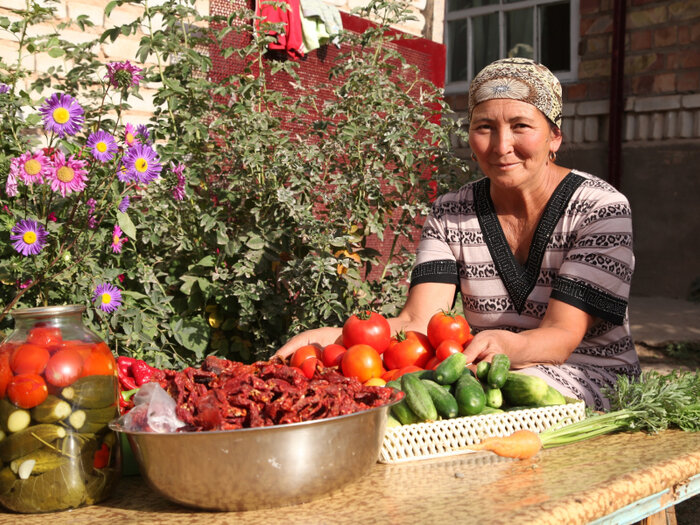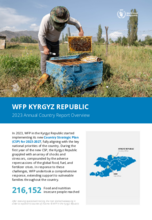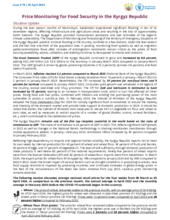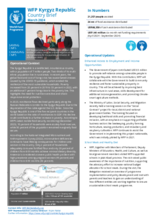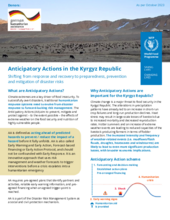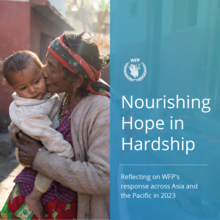Kyrgyz Republic
- 2.3 million
- people live in poverty
- 2.6 million
- people cannot afford a nutritious diet
- 7 million
- population
As a land-locked, mountainous country, the Kyrgyz Republic's economy is exposed to various risks. These include dependence on imported staple foods and fuel, labour migration, and climate-related hazards such as drought, floods and mudflows.
Poverty increased from 20 percent in 2019 to 33 percent in 2022, with nearly 2.3 million people living beneath the poverty line, according to the National Statistics Committee. Two decades of development gains were lost in just four years, as COVID-19 saw a major hit to the economy, employment and people’s incomes. This posed significant challenges to WFP’s pursuit of Sustainable Development Goal 2 on zero hunger and improved nutrition.
In 2023, staple food prices increased by over 50 percent compared to pre-COVID in early 2020. About two in five households in the Kyrgyz Republic cannot afford a nutritious diet, impacting children and women with lifelong micronutrient deficiencies. More than 70 percent of children aged 6-59 months do not meet minimum dietary diversity, and 47 percent of them along with adolescent girls are deficient in iron and other micronutrients.
The World Food Programme (WFP) has been in the Kyrgyz Republic since 2008. We strengthen national capacities and systems for social protection, emergency preparedness and response, disaster risk management and climate change adaptation, and improve food security and nutrition for the most vulnerable households.
What the World Food Programme is doing in the Kyrgyz Republic
-
Enhanced access to employment and income opportunities
-
WFP supports families through food and/or cash for participating in community projects like building or rehabilitating community assets such as irrigation systems, drinking-water pipelines and water reservoirs. We also provide training in livelihood skills such as agro processing, post-harvest storage and sewing. WFP further provides technical support to government-led initiatives such as Social Contract, helping entrepreneurs develop business plans and skills in areas such as livestock breeding and dairy product sales. This support encompasses cash grants, vocational training, financial education, social services, and mentoring.
-
Support to crisis-affected populations
-
WFP provides food and/or cash assistance to vulnerable populations in crisis-affected areas during emergencies, to meet their immediate nutrition needs and enable early recovery. WFP coordinates logistics responses as well as joint assessments and cash coordination.
-
Climate change adaptation and disaster risk management
-
WFP provides food and/or cash to communities prone to disasters and climate change risks, while they work to restore climate-resilient protective infrastructure such as dams, riverbanks and bridges. We also provide advice on climate-adaptation practices. Additionally, WFP has initiated anticipatory action to enable governments, communities and families to act before an extreme weather event occurs, including advanced forecasts and early warning. This helps populations recover from losses and damages caused by climate-related shocks, and prevents them from being pushed into food insecurity. We also provide technical assistance to local government authorities, to strengthen community-level risk profiling and planning, disaster preparedness and mitigation
-
Nutritious school meals and healthy diets
-
WFP supports the government’s National School Meals Programme, with close to 900 schools providing hot, diverse and healthy meals for primary schoolchildren. WFP has provided schools with modern kitchen equipment, fortified wheat flour and training. To improve the sustainability of the programme, WFP has established a logistics centre that links smallholder farmers with schools and other local markets.
Kyrgyz Republic news releases
Go to pagePartners and donors
Find out more about the state of food security in Kyrgyz Republic
Visit the food security analysis pageOperations in Kyrgyz Republic
Contacts
Office
52-54 Orozbekov Str., Bishkek, Kyrgyz Republic, 720040
Bishkek
Kyrgyzstan

